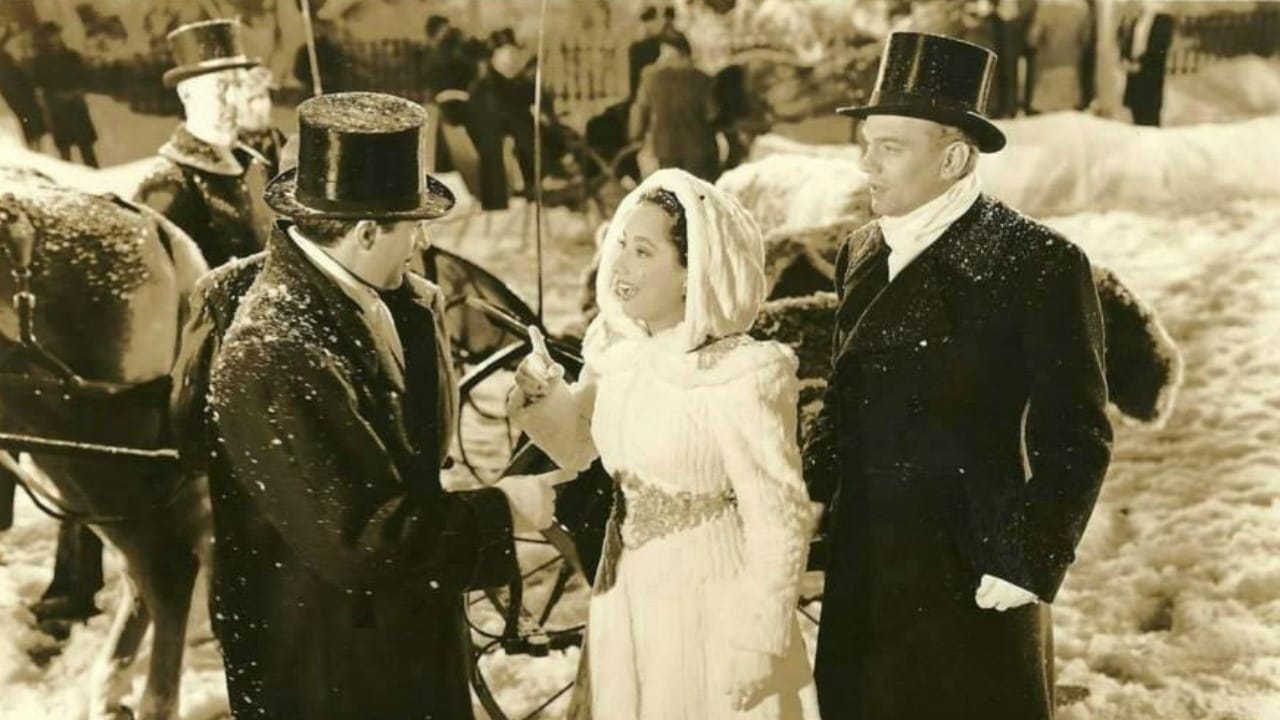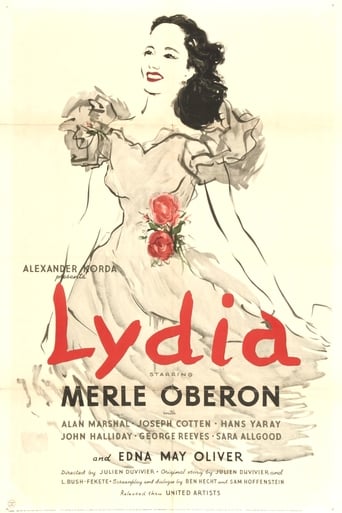Ketrivie
It isn't all that great, actually. Really cheesy and very predicable of how certain scenes are gonna turn play out. However, I guess that's the charm of it all, because I would consider this one of my guilty pleasures.
Roman Sampson
One of the most extraordinary films you will see this year. Take that as you want.
Taha Avalos
The best films of this genre always show a path and provide a takeaway for being a better person.
Ginger
Very good movie overall, highly recommended. Most of the negative reviews don't have any merit and are all pollitically based. Give this movie a chance at least, and it might give you a different perspective.
JohnHowardReid
Associate producer: Lee Garmes. Producer: Alexander Korda.
Copyright 12 September 1941 by Alexander Korda Films, Inc. An Alexander Korda Production, released through United Artists. New York opening at the Radio City Music Hall: 18 September 1941 (ran 2 weeks). U.S. release: 26 September 1941. U.K. release: 16 February 1942. Australian release: 16 April 1942. Running times: 104 minutes (USA), 98 minutes (UK & Aust). NOTES: A partial re-make of Duvivier's own 1937 Un Carnet de Bal which starred Marie Bell, Francoise Rosay, Harry Baur, Pierre Blanchar, Fernandel, Louis Jouvet and Raimu.Rozsa was nominated for an Academy Award for his Music Scoring but lost out to Bernard Herrmann's All That Money Can Buy.Despite producer Korda's efforts to showcase his wife by employing some of the finest technical talents available in 1941 Hollywood, the movie was not a financial success, barely recovering its expensive production costs.Last film of John Halliday. (He died in Honolulu on 17 October 1947).COMMENT: A wonderfully Gallic tale, full of ironies and surprises, stylishly embellished with some of the most lustrously photographed images we have ever seen. The sets too are absolute marvels of tasteful extravagance, and there's a hauntingly evocative music score by Miklos Rozsa. In short, on the technical side, just about everything needed for a movie masterpiece: a promisingly novel and potentially entertaining idea, a producer with money and acumen, a director with flair and imagination, a set designer of extraordinary intelligence and sweep, and a cameraman of such expertise and skill that the movie is always inventively lit through the eyes of both beauty and atmosphere.Despite some most enjoyable set-pieces - including a contrast between Oberon's first ball as she romantically remembers it and as it actually was; and a rousing rendition of "Tramp, Tramp, Tramp" at Tony Pastor's Saloon, complete with singing waiters, a comic tenor, a be-tighted chorus and jostlingly enthusiastic patrons, all filmed in one crowded take as the camera pans from the stage to Oberon's back table - the movie comes slightly unstuck in its script and its cast. Mrs Alexander Korda enacts the title role, which gives her not only the lion's share of the action but an off-camera commentary as well. Unfortunately she is something of a chatterbox. She never stops talking. This makes her characterization rather wearying. It's true that a man can put up with a foolish, chattering woman if he finds her attractive, so your enjoyment of Lydia will largely depend on whether you're an Oberon fan or otherwise. It would be a pity to miss Lydia on Oberon's account, because it has so many other good things going for it, not least a very credible performance by that much-maligned actor George Reeves as a boorish football player. And of course any movie with John Halliday is always worth seeing, even when his role is fairly small as here. Many would say the same about Edna May Oliver. And I thought Alan Marshal was adequate, particularly if we remember that all but his last entrance portray Oberon's vision of him, which was certainly a long way from the Richard Mason of reality.In short, a most interesting and fascinating movie which, despite its shortcomings, doesn't seem to deserve its current neglect.
wes-connors
After dedicating a home for blind and crippled children, doddering old Merle Oberon (as Lydia MacMillan), who never married, attends a surprise gathering of her old boyfriends. The reunion is arranged by physician Joseph Cotten (as Michael Fitzpatrick). The son of Ms. Oberon's family butler, Mr. Cotten has also invited blind musician Hans Jaray (as Frank Andre) and future "Superman" George Reeves (as Bill Willard). A fourth beau, seafaring adventurer Alan Marshal (as Richard Mason) may or may not appear. He is one of the story's mysteries, so stay tuned. Oberon and her old suitors reminisce about their romances, in flashbacks beginning in 1897, when "the prettiest girl in Boston" was a desirable young maiden..."Lydia" is a re-make of director Julien Duvivier's "Un carnet de bal" (1937), re-fashioned entirely for star Merle Oberon by producer Alexander Korda. The original French export was a worldwide hit, with Mr. Duvivier and his remarkable original players receiving much critical acclaim. There are some significant changes in the story, but they do improve the central played by Mrs. Korda (Oberon). She is the reason for the picture, clearly. An impressive group was hired for this motion picture; their skills are intermittently evident, but the totality of the film is far too pretentious...Watch "Lydia" for the production values and moments of perfection. You'll find much of the latter in the work of supporting actress Edna May Oliver (as Sarah "Granny" MacMillan). This was the last appearance of Ms. Oliver, a classic character actress who became the most valuable player nearly every time she appeared on screen. Oliver's character appears in the flashbacks, as Oberon's wealthy and outspoken grandmother. She complains about mysterious internal ailments, but is considered a hypochondriac. The veteran actress died in 1942, of internal ailments. In real life, Oliver passed away peacefully in her sleep. On screen, she plays her expiration scene with Shakespearian majesty. This is how it should be done.****** Lydia (9/18/41) Julien Duvivier ~ Merle Oberon, Joseph Cotten, Edna May Oliver, Alan Marshal
Jem Odewahn
Exotic Anglo-Indian beauty Merle Oberon, best known for her great turn as Cathy in the 1939 film version of 'Wuthering Heights', is at the centre of this pleasant, melodramatic 1941 offering. She plays Lydia MacMillan, an ageing wealthy philanthropist who has never married. Lydia and three of her suitors meet together early in the film, and in an extended flashback they, and the viewer, find out why the lovely, winsome girl never ended up with a ring on her finger.Oberon gives a very good performance here. She is convincing as both the beguiling young Lydia and the mature, somewhat hardened older version of herself. Edna May Oliver, in a role she would have relished, is also fine as Oberon's aunt. Joseph Cotten is in the mix too, in one of his nice-guy roles.It's a very sentimental, shamelessly romantic piece with some poignant moments.6/10
Michael
An unexceptionable pleasure to the primary senses of the eyes and ears. This results from a combination of Oberon's lush eyebrows and the pillowy opulence one imagines from a director with a surname like Duvivier. The film is a 'refashioning' of his French-language 'Un Carnet De Bal' from 1937, in that the basic plot is Oberon's portmanteau recollection of 4 past loves. Cynics may understandably dive for the sick bags, but it's a pleasant surprise therefore to find that for all the typical Fox emphasis on visual scrumptiousness, this romantic opus turns out to be a narratively literate affair. It's lent considerable dramatic weight by an excellent cast, including an uncharacteristically unhistrionic Oberon.

